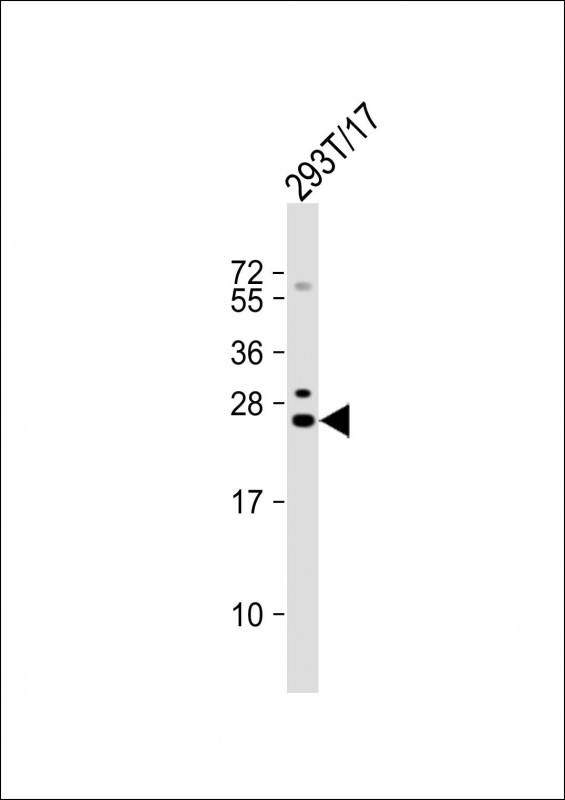

| WB | 1/1000 | Human,Mouse,Rat |
| IF | 咨询技术 | Human,Mouse,Rat |
| IHC | 咨询技术 | Human,Mouse,Rat |
| ICC | 技术咨询 | Human,Mouse,Rat |
| FCM | 咨询技术 | Human,Mouse,Rat |
| Elisa | 咨询技术 | Human,Mouse,Rat |
| Aliases | DNA replication complex GINS protein PSF3, GINS complex subunit 3, GINS3, PSF3 |
| Entrez GeneID | 64785 |
| WB Predicted band size | 24.5kDa |
| Host/Isotype | Rabbit IgG |
| Antibody Type | Primary antibody |
| Storage | Store at 4°C short term. Aliquot and store at -20°C long term. Avoid freeze/thaw cycles. |
| Species Reactivity | Human |
| Immunogen | This GINS3 antibody is generated from rabbits immunized with a KLH conjugated synthetic peptide between 190-216 amino acids from the C-terminal region of human GINS3. |
| Formulation | Purified antibody in PBS with 0.05% sodium azide. |
+ +
以下是关于GINS3抗体的3篇参考文献及其摘要概括:
1. **文献名称**:*GINS3 expression correlates with clinical prognosis and immune infiltration in colon cancer*
**作者**:Li, X., et al.
**摘要**:该研究利用GINS3特异性抗体,通过免疫组化技术分析结肠癌组织中GINS3蛋白的表达水平,发现其高表达与患者预后不良及肿瘤微环境中免疫细胞浸润减少相关,提示GINS3可能作为结肠癌的潜在治疗靶点。
2. **文献名称**:*The role of GINS complex subunit 3 in maintaining stem cell pluripotency*
**作者**:Wang, Y., et al.
**摘要**:研究通过Western blot和免疫荧光技术(使用GINS3抗体),证明GINS3在小鼠胚胎干细胞中高表达,并参与调控DNA复制和细胞周期进程,敲低GINS3导致干细胞自我更新能力显著下降。
3. **文献名称**:*Development and validation of a monoclonal antibody against human GINS3 for cancer biomarker studies*
**作者**:Zhang, R., et al.
**摘要**:该文献报道了一种新型兔源单克隆GINS3抗体的开发,通过ELISA、免疫印迹及流式细胞术验证其高特异性和灵敏度,并应用于多种癌症细胞系及组织样本,证实GINS3在肺癌、乳腺癌中异常高表达。
---
**备注**:若需具体文献来源或补充更多研究,可进一步提供数据库(如PubMed ID)或扩展检索关键词(如结合“DNA复制复合体”或“癌症生物标志物”)。
The GINS3 antibody is a research tool designed to detect the GINS complex subunit 3 (GINS3), also known as PSF3. a critical component of the GINS complex essential for DNA replication. The GINS complex, composed of SLD5. PSF1. PSF2. and PSF3 (GINS1-4), plays a pivotal role in the initiation and elongation phases of DNA replication by stabilizing the interaction between the MCM helicase and other replication machinery. GINS3. specifically, contributes to the structural and functional integrity of the complex, facilitating the assembly and progression of replication forks.
Antibodies targeting GINS3 are widely used in molecular biology to study replication mechanisms, cell cycle regulation, and genome stability. They enable detection and localization of GINS3 in techniques like Western blotting, immunofluorescence, and immunohistochemistry. Research involving GINS3 antibodies has linked its dysregulation to diseases such as cancer, where aberrant replication can drive genomic instability, and developmental disorders linked to defective cell proliferation.
GINS3 is evolutionarily conserved, underscoring its fundamental role across species. Studies in model organisms, such as yeast and mice, have revealed its necessity for embryonic development and viability. By probing GINS3 expression or interaction partners, researchers aim to uncover therapeutic targets for replication-related pathologies. Validation of these antibodies typically involves knockout controls or recombinant protein assays to ensure specificity, given the structural similarities among GINS subunits.
×